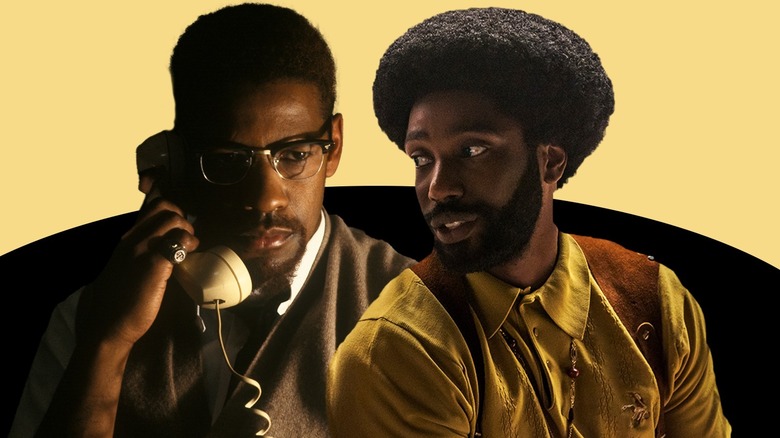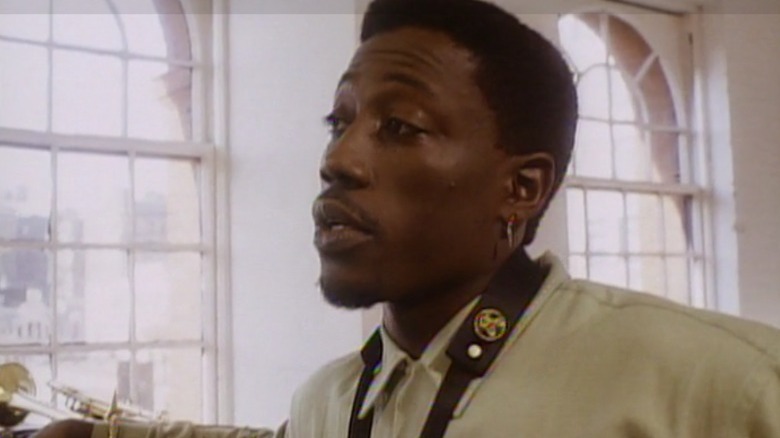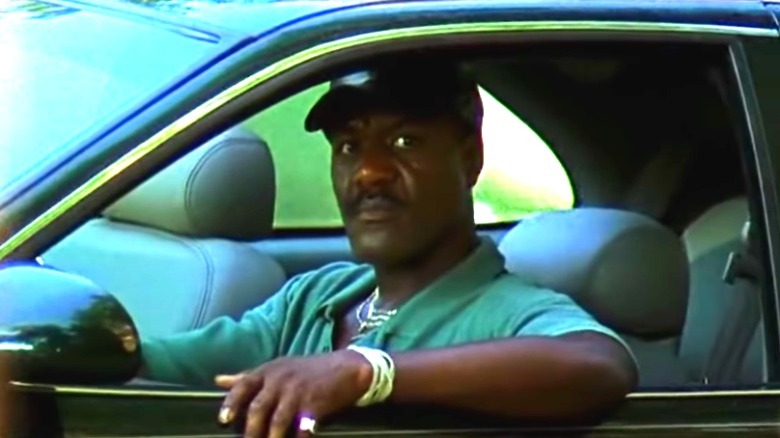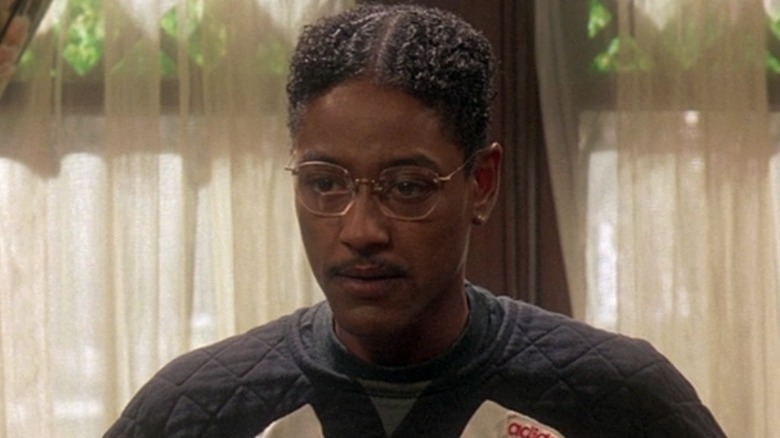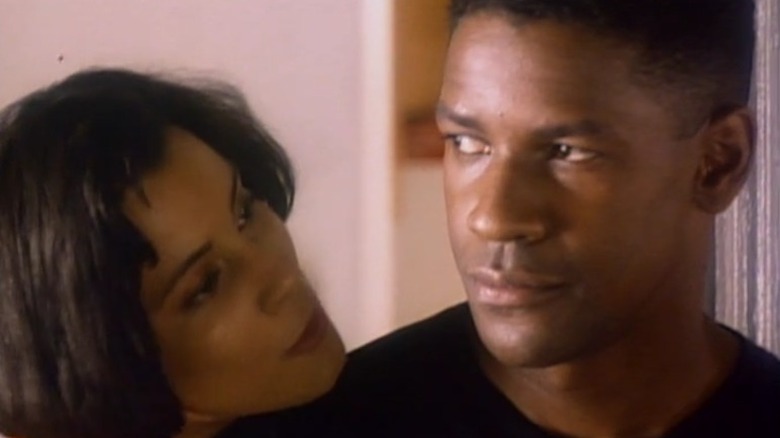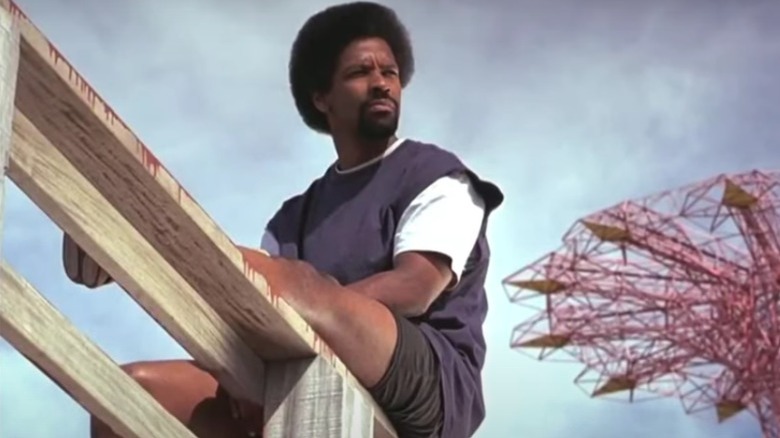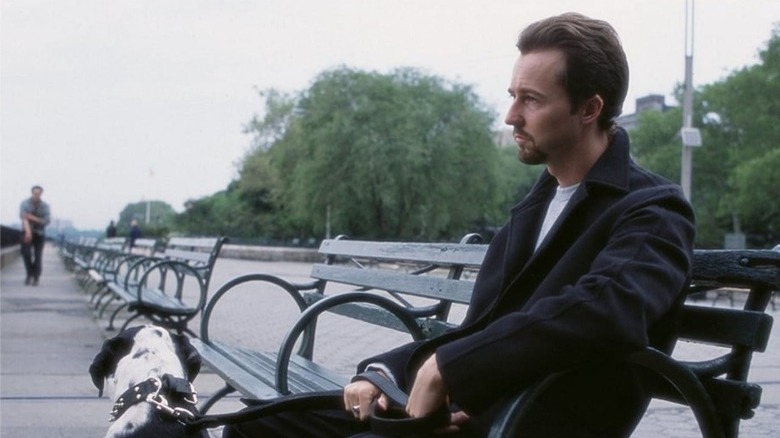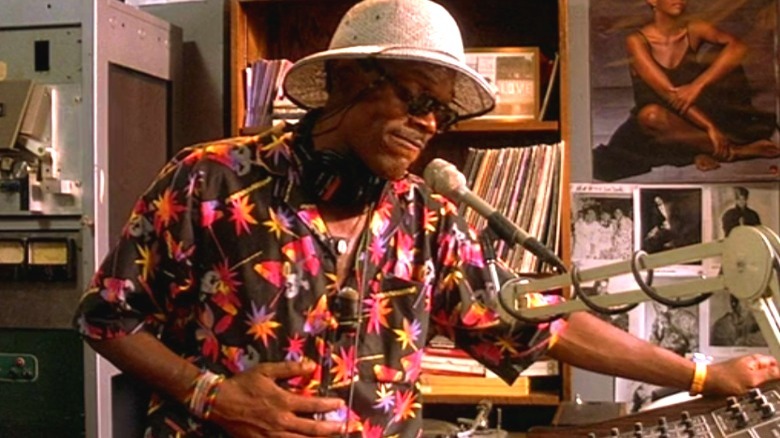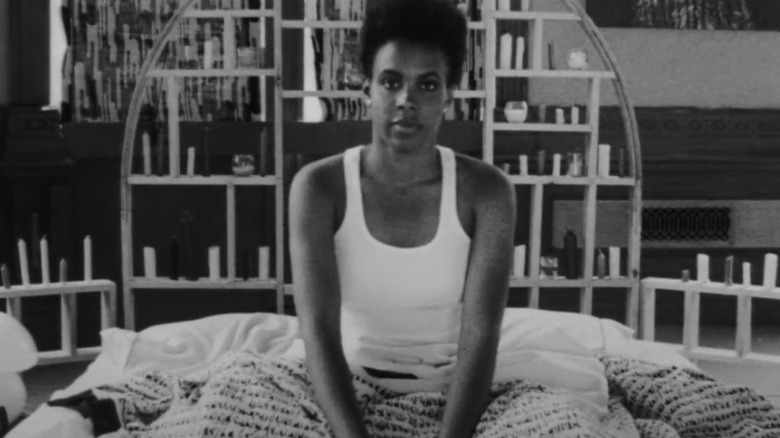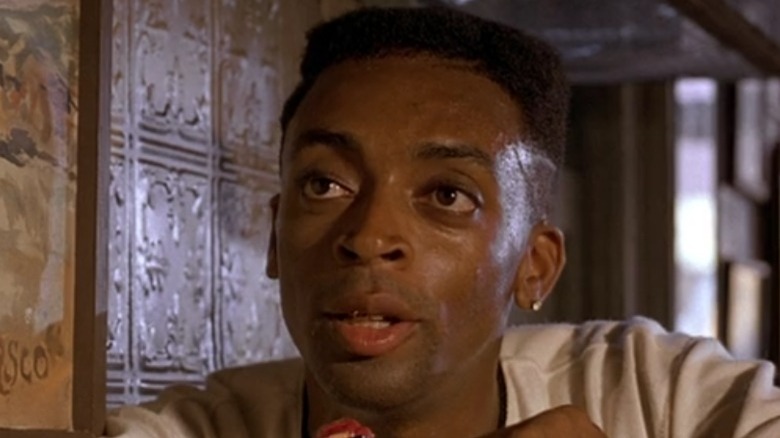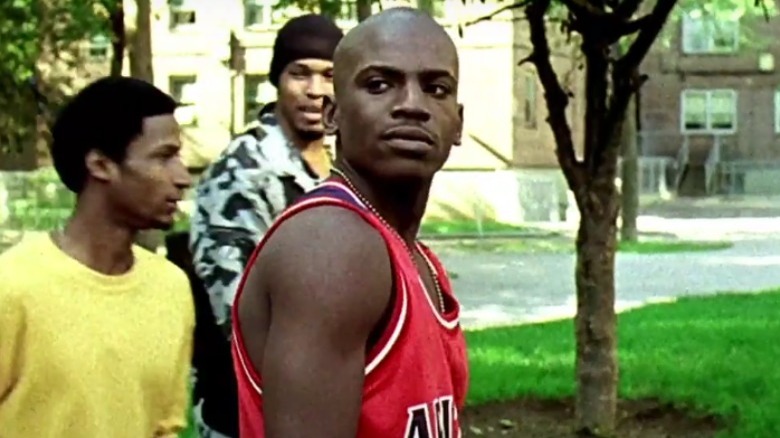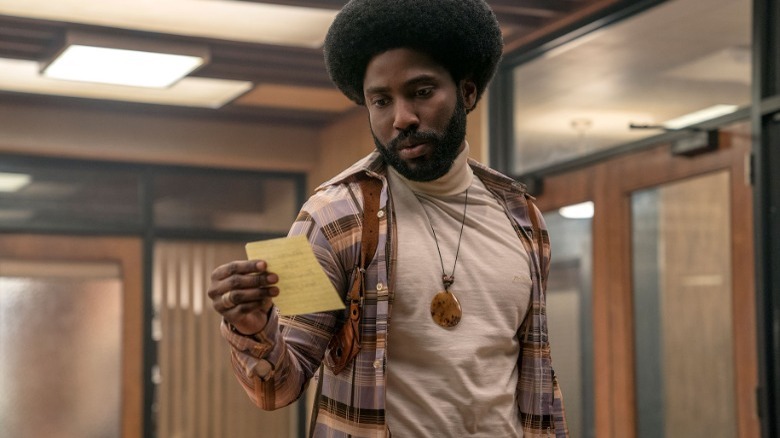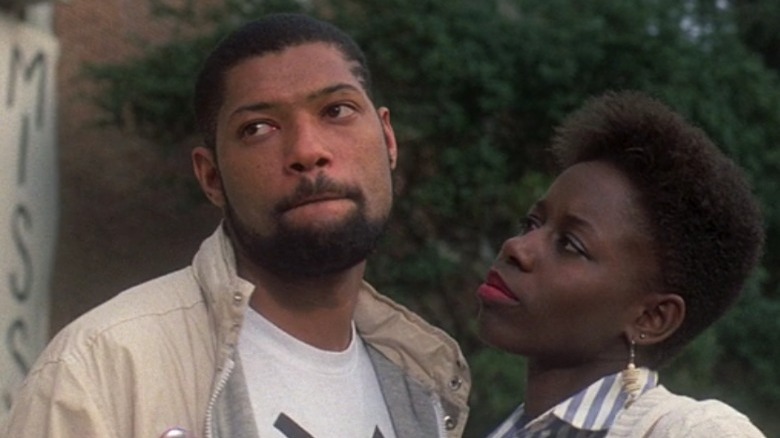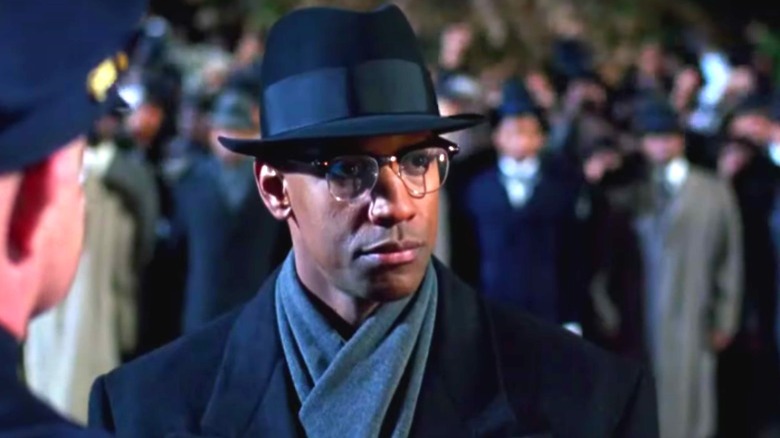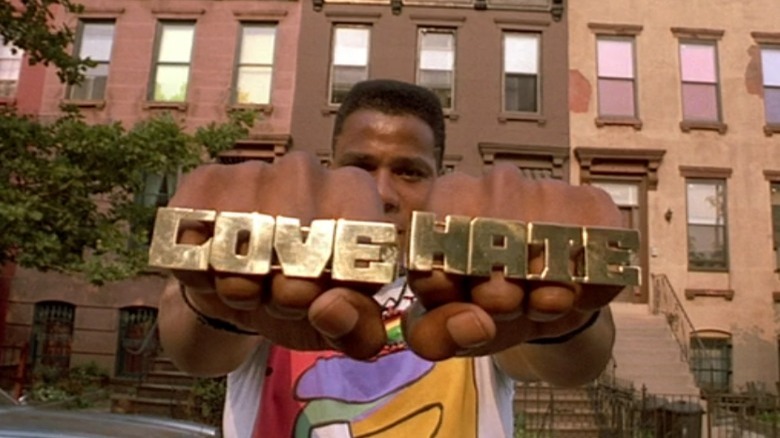The 14 Best Spike Lee Characters, Ranked
Regardless of genre, the best films typically revolve around compelling, multi-dimensional characters who viewers can become emotionally invested in. Since the mid-'80s, filmmaker Spike Lee has given life to characters who remain memorable long after the credits roll. Lee's characters are more than just the protagonists of their respective stories; they're vehicles for the director's social commentary. His films frequently tackle racial politics, which these characters face head-on in their daily lives. For them, discrimination and poverty are ever-present facts of life that shape their decisions and motivations.
However, these characters' greatest strength is the humble, true-to-life nature of their personalities. They frequently smash stereotypes, giving audiences a glimpse at the humanity behind their outward personas. For instance, several Spike Lee joints feature would-be criminals who receive as much empathy and development as traditional heroes. Many of Lee's characters become symbols of hope and resilience, while others are hysterical everymen who could easily be your neighbors or friends. They struggle to find love, prosperity, and purpose in a world that stacks the deck against them, and their losses and triumphs become enduring universal stories that highlight a side of the American experience that often goes unseen.
14. Shadow Henderson — Mo' Better Blues
Spike Lee kicked off the 1990s with "Mo' Better Blues," a dramedy about an ill-fated musician named Bleek Gilliam (Denzel Washington). His bandmate, Shadow Henderson (Wesley Snipes), is a talented, ambitious saxophone player who wants to strike out on his own. Shadow steals the spotlight with extended solos, launching a rivalry between the two musicians. Despite his attempts to usurp Bleek, Shadow still acts as his support system when it counts. For example, when Bleek suffers a near-fatal beating, Shadow puts their rivalry aside to help him. This dynamic character exists in the space between enemy and best friend.
Though he is an intriguing and ever-present force in the film, Shadow is not as strong as some other supporting characters. Unfortunately, like many of Spike Lee's creations, Shadow often embodies his name. He brilliantly commands center stage, but also easily slips into the background. He therefore has far fewer poignant scenes than his more famous counterpart. However, whereas Bleek's intense focus on the limelight blinds him to the troubles in his life, Shadow maintains an effortless balance. His music often has a stronger voice than he does, but that leads to enduring success.
13. Rodney Little — Clockers
Father figures take many forms in Spike Lee joints, but few are as vicious as Rodney Little (Delroy Lindo), the drug lord at the heart of "Clockers." Rodney manipulates his young dealers and weaponizes paternal affection to satisfy his greed. He endears himself to his crew through a twisted kind of tough love, providing the structure they crave while still posing an ever-present threat. He puts young men in harm's way for profits, but shares wisdom in small, almost heartwarming moments. These moments keep his dealers under his spell, but his cold-hearted nature always lurks below the surface.
His calm, collected image unravels when he forces the barrel of a gun into a dealer's mouth and overtly threatens his life. With the thin veil of poise ripped away, Rodney permanently loses some of his dimension. Despite revealing some dark details about his past and being an obvious product of his environment, he never has a redemptive moment. Instead, his entire personality is id and rage. Even the pain of being betrayed by his closest follower devolves into a selfish, destructive tantrum. Rodney is an incredibly memorable character, but one of the least sympathetic that Lee has ever created.
12. Julian Big Brother Almighty Eaves — School Daze
Spike Lee's second feature, "School Daze," follows multiple students at Mission College, a historically black university. At the epicenter of this undergrad tale is Julian "Big Brother Almighty" Eaves (Giancarlo Esposito), a senior Gamma Phi Gamma fraternity member whose nickname hints at his self-importance. Julian is the epitome of the "big man on campus" archetype, with fraternity brothers who admire him and a girlfriend who fills other men with envy. He exudes an undying air of superiority and is unapologetically ruthless. Yet, Julian knows who he is and has no interest in changing.
Although his position allows him to spread positivity, his god complex compels him to abuse his power instead. In one of Julian's first scenes, he leads a group of pledges around on a leash, thoroughly enjoying their public humiliation. It's a cringeworthy moment, but his exaggerated mannerisms and outlandish power trip make it a hilarious start to the film. Despite all of his awfulness, Julian is the comic relief "School Daze" needs. However, he is also a cautionary tale about the dangers of unchecked power, even within microcosmic environments like Mission College.
11. Bleek Gilliam — Mo' Better Blues
Bleek Gilliam is a dedicated trumpet player, shameless philanderer, and the protagonist of "Mo' Better Blues." Bleek is a very appropriately-named character because his future as a musician is quite bleak. Although undeniably talented, his off-stage decisions ultimately deprive him of the success he might have enjoyed. Bleek is embroiled in love affairs with two different women, feuding with one of his bandmates, and relying on an ineffective manager with a gambling addiction. Instead of addressing these issues, Bleek uses music to blind himself until the consequences of his choices become impossible to ignore.
Although he'd never win any awards for his sense of morality, Bleek is a solid main character. His undying dedication to his craft is admirable but also obsessive. Music is both the love of his life and his undoing, and that duality creates a universal story. Ultimately, his is a tale of redemption and building a good life after a tragedy. However, for all his intrigue, Bleek is not exactly a likable character. His singular focus in life makes it difficult to relate to him and, therefore, harder to cheer for than some of Lee's more multi-dimensional protagonists.
10. Jake Shuttlesworth — He Got Game
"He Got Game" is a movie about basketball, but it also demonstrates that atonement comes in many forms. A convict named Jake Shuttlesworth (Denzel Washington) receives a one-in-a-lifetime opportunity to shorten his prison sentence if he can convince his son, Jesus (Ray Allen), to play basketball for a governor's alma mater. However, Jake's estranged relationship with Jesus makes this a tall order, even with a week of supervised release. He decides to face his past head-on and try to bond with his son over their shared love of basketball.
Even-keeled Jake isn't the most memorable Spike Lee character, but he takes an admirable approach to his circumstances. Despite Jesus' choice being the potential key to his freedom, he approaches the situation cautiously. It would be easy to portray Jake as a desperate convict who will do anything to sway Jesus, but Lee instead allows him to be what he is: a father seeking forgiveness. Jake is undeniably well-conceived, but his lack of emotional range or a sweeping character arc makes him more forgettable than he deserves to be. In a film filled with slow, quiet moments, Jake's integrity speaks for itself.
9. Montgomery Monty Brogan — 25th Hour
The 2002 film "25th Hour" incorporates the somber atmosphere of post-9/11 New York into a story about a convicted criminal facing a lengthy prison sentence. Drug dealer Montgomery "Monty" Brogan (Edward Norton) has just 24 hours to get his affairs in order before his sentence begins, and he feels the pressure to soak up every last minute of freedom. Regret is a significant component of Monty's pre-incarceration swan song, with plenty of self-pity on the menu as well. While you can understand why Monty feels sorry for himself, his attitude initially makes it a little difficult to warm up to him.
Monty may not make as strong of a first impression as some of Lee's best protagonists, but Monty's strength is his deeply layered personality. Viewers discover the fear and compassion he hides beneath his tough exterior as his story unfolds. Throughout his final day as a free man, Monty is alone in a sea of people, contemplating his life and making peace with his choices. Although he initially blames the world for his fate, he also curses his own greed and carelessness. Monty's story is about self-forgiveness, which is often the hardest type to achieve.
8. Mister Señor Love Daddy — Do the Right Thing
In 1989, "Do the Right Thing" put Lee on the map with a story about social unrest in Bedford-Stuyvesant, Brooklyn. The film opens with Mister Señor Love Daddy (Samuel L. Jackson), a radio host who begins his 8:00 AM segment with a blaring alarm clock and a command for listeners to "wake up." This scene creates a subtle continuum with Lee's previous movie, "School Daze," which ends with a student ringing a bell and the same demand. This connection immediately indicates that Love Daddy is an important messenger.
Love Daddy has some of the best lines in the film, but rarely interacts with anyone. The neighborhood mostly takes his presence for granted, such as when the local pizza delivery boy, Mookie (Spike Lee), is late with Love Daddy's lunch because he stops to argue with another character. However, Love Daddy's voice echoes throughout the film, offering keen observations about the state of the neighborhood. He becomes an indispensable vehicle for the film's message about the consequences of unaddressed racial tensions, which are — as he is — ever-present in the background. "And that's the double truth, Ruth."
7. Nola Darling — She's Gotta Have It
Proud womanizers are common in films, but Spike Lee shows the flip side of that stereotype in 1986's "She's Gotta Have It." Nola Darling (Tracy Camilla Johns) is a visual artist who maintains romantic relationships with three men, all of whom are aware of each other's existence. One hilarious scene features Nola inviting her lovers to spend Thanksgiving with her — at the same time. Unsurprisingly, the only one who expects a peaceful evening is Nola, who is quickly disappointed by the men's rivalry.
Nola's most striking characteristics are her integrity and dogged pursuit of happiness. She could easily lie to each of her suitors to keep the peace, but refuses to be dishonest about her life choices. Even better, she doesn't require the acclaim many male characters would seek if they were in her shoes. For Nola, dating multiple men isn't about racking up conquests — it's about happiness. While society probably didn't accept her behavior in the 1980s (and likely wouldn't now, in many respects), she doesn't care about living up to anyone's standards but her own. Strong female protagonists are a rarity in Spike Lee films, but Nola is the gold standard.
6. Mookie — Do the Right Thing
Spike Lee frequently appears in his own films, but few of his onscreen appearances are as memorable as his role in "Do the Right Thing." Lee plays Mookie, a young man who is the glue between the Italian-owned Sal's Pizzeria and the surrounding Black community of Bedford-Stuyvesant, Brooklyn. Mookie doesn't take anything seriously, including his job or responsibilities as a father. Nevertheless, his outgoing, affable nature makes it easy for him to get along with both his neighbors and his boss, Sal (Danny Aiello). When racial tensions flare in Sal's Pizzeria, Mookie even serves as a peacemaker. However, his actions are motivated by a desire to remain employed, not by any moral principles.
Later, Mookie finally chooses convictions over comfort when he starts a riot outside Sal's. Mookie's choice to throw a trash can through the shop's window is one of the most powerful, unforgettable moments in any Spike Lee film, and his transformation from slacker to community activist leaves an enduring impression. "Do The Right Thing" isn't Mookie's only film appearance, either. In 2012, Spike Lee reprised this iconic role in "Red Hook Summer," where Mookie appears wearing his original "Sal's Pizzeria" shirt.
5. Strike — Clockers
Some of the best characters in Spike Lee's movies have unexpected quirks that elevate them above familiar tropes. For example, although most movies portray drug dealers as one-dimensional villains, Lee uses unique personality traits to humanize Strike (Mekhi Phifer) in "Clockers." Whereas the film's beginning makes it appear that Strike is thriving in the drug trade, his subtly childlike characteristics demonstrate that he is a victim of his circumstances. For example, Strike doesn't go anywhere without a bottle of Chocolate Moo, an immature choice of a beverage that he believes helps his severe stomach issues.
Indeed, while watching Strike endure the harsh realities of life as a small-time pusher, it's easy to forget that he's only 19 years old. However, audiences are reminded of his youth through an unusual hobby: Strike loves tinkering with model trains. While the drug-pushing side of his life is fast-paced, this pastime is calm and meditative. Furthermore, watching Strike lose himself in his pursuit endears him to viewers without robbing him of his dignity. Rather than hammer audiences with the tragedy of seeing Strike grow up too quickly, the train set is a silent representation of his arrested development. His eventual escape from the neighborhood is a touching triumph because Strike truly deserves a second chance.
4. Ron Stallworth — Black KkKlansman
In 2018, Spike Lee brought the incredible true story of detective Ron Stallworth to life in "Black KkKlansman." In the 1970s, Stallworth — a Black man — successfully became a card-carrying member of the Ku Klux Klan through a complex intelligence operation. Although Stallworth is African-American, his ingenuity and impressive gift of gab helped him win the favor of several influential Klan leaders. With help from a white police officer who poses as Stallworth for in-person meetings, the detective exposes the harrowing crimes committed by the organization.
John David Washington brings Stallworth to life in the film, following in the footsteps of his father, Denzel Washington, who has notably appeared in multiple Spike Lee productions. Washington expertly captures the complex emotional world of a man caught between two worlds. Although Stallworth is a dedicated police officer, he also faces racism inside and outside the department. These experiences are painful, and Stallworth shows an incredible amount of restraint in how he handles volatile situations. He is among the funniest of Lee's protagonists, and has the best sense of humor about himself and the world around him.
3. Vaughn Dap Dunlap — School Daze
At the beginning of "School Daze," audiences meet Vaughn "Dap" Dunlap, a politically active senior at Mission College. In many ways, Vaughn is a typical student, enjoying hanging out with friends and spending time with his girlfriend, Kyme (Rachel Meadows). However, despite his youth, Vaughn already has a firm grasp on the importance of the world outside of college. While his fellow students concern themselves with football games and fitting in, Vaughn protests South Africa's apartheid and raises awareness on campus.
Vaughn's actions firmly plant "School Daze" in the cultural climate of its day. This movie hit theaters in 1988, when the pressure to end apartheid was at an all-time high. For example, an article from The Michigan Daily announced the University of Michigan's decision to divest remaining holdings in South African companies, a process many U.S. institutions undertook in the 1980s. Undoubtedly, Vaughn acts as the film's messenger. As the movie draws to a close, he makes one final plea for the student body — and the audience — to heed his call. He stands in the quad at daybreak, ringing a bell and uttering a hauntingly memorable refrain: "Wake up ... wake up ... wake up."
2. Malcolm X — Malcom X
In 1965, Alex Haley published "The Autobiography of Malcolm X." While most autobiographies are self-written, this book is the result of a collaboration; the human rights activist told Haley his life story, and Haley put it on paper. The book later became the inspiration for 1992's "Malcolm X." Like the text, the film digs below the surface of the leader's cult of personality and sheds light on his complicated origin story and road to redemption. Although Spike Lee wasn't the first filmmaker to work on "Malcolm X," he was the one who finally brought the longstanding project across the finish line.
The film's script beautifully captures the spirit of the original autobiography, and, as a result, the dramatized Malcolm X (Denzel Washington) embodies the charm and determination of his real-life counterpart. As he follows Malcolm X's journey from wayward teenager to activist, Washington's performance is stunningly lifelike. Many events unfold on screen exactly as they did on the page. In speaking to The Baltimore Sun, Washington explains that he felt confident after receiving positive feedback for playing Malcolm X on stage. That confidence radiates through his portrayal of the activist as a multi-faceted and deeply passionate leader, father, and human being.
1. Radio Raheem — Do the Right Thing
Radio Raheem (Bill Nunn) is the most irreplaceable character in "Do the Right Thing." Radio is named for his beloved boombox, of course, which he carries everywhere while blasting one song: Public Enemy's "Fight the Power." The song's history as a protest anthem complements Radio's imposing stature and obvious pride in his identity. His clothing choices reflect both sides of his heritage: African and American. His signature t-shirt reads "Bed-Stuy Do or Die," and he wears an African-inspired pendant. However, Radio's most recognizable accessories are his massive rings, which read "Love" and "Hate."
Of all the supporting characters in Spike Lee's arsenal, Radio has the most weight behind his words. He doesn't have as many lines as the other characters, but when he does speak, everyone sits up and takes notice. In a simple but incredibly powerful monologue, Radio discusses the battle between love and hate, linking the concept to the battle between good and evil and the story of Cain and Abel. His wrongful death at the hands of police officers is the final spark that ignites the neighborhood's racial powder keg. In the end, Radio is not just one young man in a Brooklyn ghetto. He is every victim of police brutality, including those who suffer hauntingly similar deaths over three decades later. Most importantly, Radio is a choice: confront one's enemy with hate and violence, or embrace the belief that love can conquer all.
